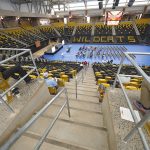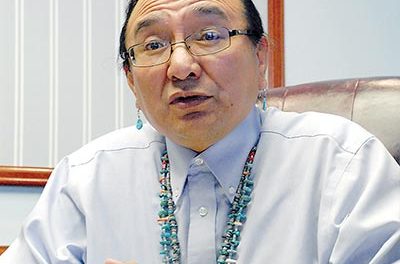
Indoor smoking ban bill advances
WINDOW ROCK
As public awareness about the safety of the air we breathe has risen to the forefront with COVID-19, casinos across the country have reopened smoke-free after being shuttered due to the pandemic, including Navajo Nation Gaming Enterprise casinos.
According to the American Nonsmokers’ Rights Association, there are now over 1,000 casinos and other gaming properties in the United States with 100% smoke-free indoor air policies, including more than 160 Indian gaming facilities.
However, whether or not the Navajo Nation’s casinos will remain smoke-free post COVID-19 is still up for debate. At issue is the business impact of smoking bans on casino volume and revenue.
Concurrently, a proposed comprehensive smoke-free policy for the Nation, sponsored by Delegate Daniel Tso, chairman of the Health, Education and Human Services Committee, is moving through the Council’s standing committees with the goal of finally codifying a clean -air mandate into law.
Called the “Air is Life Act,” or “Nilch’ ei Bee Iina,” the bill would prohibit the use of commercial tobacco products in all indoor public places and workplaces across the Nation, including the casinos. The act would not restrict commercial tobacco use in private residences.
Protecting the people
Delegate Thomas Walker, vice-chair of the Resources and Development Committee, said the bill is supported by the Navajo people.
“(The bill) is coming straight from the communities,” said Walker. “The public certainly has the right to ask their leaders to make or change laws that affect or benefit their health.”
This comes after over 16 years of advocacy by nonprofits, health organizations, government officials and traditional practitioners that have promoted anti-smoking policies through a coalition called “Team Navajo” that in 2006 identified the lack of a smoke-free policy as a major public health issue.
The states of Arizona, Utah and New Mexico passed smoke-free laws over a decade ago but the Navajo government has yet to follow suit.
“To me it’s a very simple health policy,” said Diné public health policy analyst Hershel Clark with the Air is Life Coalition, an outgrowth of Team Navajo. “It’s very similar to what exists when you go off the reservation. We’re just advancing ourselves into modern public health policies.”
As of now, the only existing smoke-free policy on Navajo covers the executive branch buildings and offices.
The bill states that it is the “right and freedom of the people” that every person is respected, honored, and protected with a healthy physical and mental environment, “free from all abuse,” including exposure to commercial tobacco smoke.
“It’s really just about protecting our people,” said Clark.
He said in many ways it took COVID-19 for people to change their attitudes and beliefs around the smoke-free issue, and now it’s really up to leadership to follow through.
“Health is a big priority now,” he said.
Ceremonial tobacco exempted
The Air is Life Act does not prohibit the use of natural ceremonial tobacco, or Dzil Nat’oh/Mountain Smoke, recognized as an integral part of Diné life, culture and spirituality and important to the wellness and welfare of Diné people.
“This is not to limit or infringe upon the use of the traditional smoking herbs, Nat’oh,” said Walker. “We all know our elders, leaders and healers treat the medicinal plants as a community of living entities that can be invoked, approached and asked to assist the humans in their time of need.”
On the other hand, addictive commercial tobacco, filled with toxic chemicals and additives, is harmful to humans, he said.
The proposed Air is Life Act states, “Air embodies life… The use of all commercial tobacco products is disrespectful to the Diné fundamental traditions and thus harms our environment resulting in disharmony with the mind, body, spirit, and earth.”
Also secondhand commercial tobacco smoke has been classified by the U.S. Environmental Protection Agency as a carcinogen that can cause cancer, cardiovascular disease, and other illnesses in humans and is even more toxic than what a smoker inhales.
The bill states that there is no safe level of exposure to secondhand commercial tobacco smoke and that no ventilation technology can ensure the protection and prevention of illnesses it can cause.
‘A lot at stake’
However, an Aug. 6 NNGE white paper prepared by its outside legal counsel, Lewis Roca Rothgerber Christie LLP (“Lewis Roca”), advises that “in weighing the costs and benefits” of the proposed smoking ban, policy makers should evaluate the financial impacts on Navajo Nation casino revenue and the economy.
According to the report, research demonstrates that gaming revenue is likely to drop by at least 15% to 30% or more following implementation of a smoking ban.
“Our primary mission is the creation of jobs, employment, economic output and development for the Navajo Nation, and providing a good rate of return on the Nation’s investment in the enterprise,” NNGE Executive Director Brian Parrish told Navajo Times.
“A fifteen to thirty percent reduction in volume of business definitely makes achieving all those goals much, much tougher,” he said.
Parrish said NNGE is preparing to speak with Navajo Nation leaders on the issue.
“We want to discuss this with leadership and give them all of the facts and data so that together we can all try to make an informed decision about what’s best,” he said.
Since 2006, when NNGE was founded to develop and manage casinos, the organization has resisted the effort to go smoke-free, which has created a key barrier to implementing a comprehensive smoke-free policy on the Nation.
“Casino losses suffered in other jurisdictions when smoking bans were established warrants caution and consideration of alternative measures to eliminate smoking impacts,” states Lewis Roca. “The Navajo Nation has a lot at stake.”
NNGE generates revenues that finances essential governmental services for the Navajo Nation and has created over 1,300 jobs, 85% of which are held by Navajos, states Lewis Roca.
In its first 11 years of operations, NNGE supplied more than $250 million to the Navajo Nation in the form of debt repayment, contributions to the Gaming Distribution Fund, support for local police and fire protection, taxes, business-site leases, land transfers, and payments toward the Navajo Nation Employee Benefits Plan.
Lewis Roca recommends the Nation consider alternatives to a complete tobacco smoking ban, including an exemption for casinos, limiting tobacco use through the creation of non-smoking sections on casino floors, and implementing “next generation” air cleaning systems.
‘Safety driven’
In a HEHSC meeting on Aug. 25, Chairman Tso said prohibition of the use of commercial tobacco products indoors is to “protect and prolong the health and safety of Navajo citizens.”
However, HEHSC Delegate Pernell Halona expressed concern over the forecast reduction in revenues.
“I think a ban is a little bit severe,” said Halona. “The casinos will have a tremendous impact. We need to find a way to allow for people to continue to do their smoking.
“It’s a pastime,” he said. “Maybe they’re addicted. A casino is also a pastime. A person can go and try to satisfy their need for wanting to win some money.”
He recommended possibly segregating smokers in designated smoking areas.
“That all can be done,” said Halona. “If we put this ban on smoking, we’re going to be hurting our pocketbooks as well.”
In the meantime, Parrish said NNGE is “in no rush” to go back to smoking right now because, for now, safety and curbing the spread of COVID-19 remains the first priority.
“We’re being very cautious, prudent and safety-driven with everything that we’re doing,” he said.
Parrish said NNGE is also making a large investment in enhancing the air filtration systems at the Navajo casinos with a new product, ActivePure Space Technology, by Aerus that they are installing in upcoming weeks.
“It’s a special technology that kills all viral cells and scrubs the air of any kind of harmful particulates,” said Parrish. “It dramatically improves and increases the cleanliness of the air.”
He said the new technology will further enhance the sanitization and safety of the casino environment.
“I think the Navajo Nation Gaming Enterprise is doing a fine job in protecting the health of the people,” said Walker. “They should be commended because they encourage use of PPE, temperature checks, tracking systems for contact tracing, and right now they are smoke-free.”
Walker said no one wants to see Navajo gaming lose revenue, but he has confidence that NNGE leadership can make the casinos profitable, even with a smoking ban.
“We don’t want to see them fail,” said Walker. “We want them to succeed.”







 Highway 264,
Highway 264, I-40, WB @ Winslow
I-40, WB @ Winslow